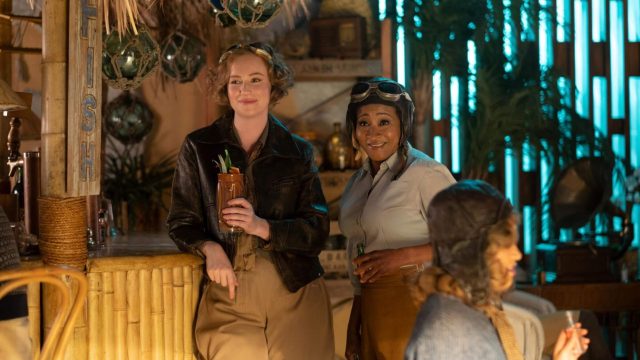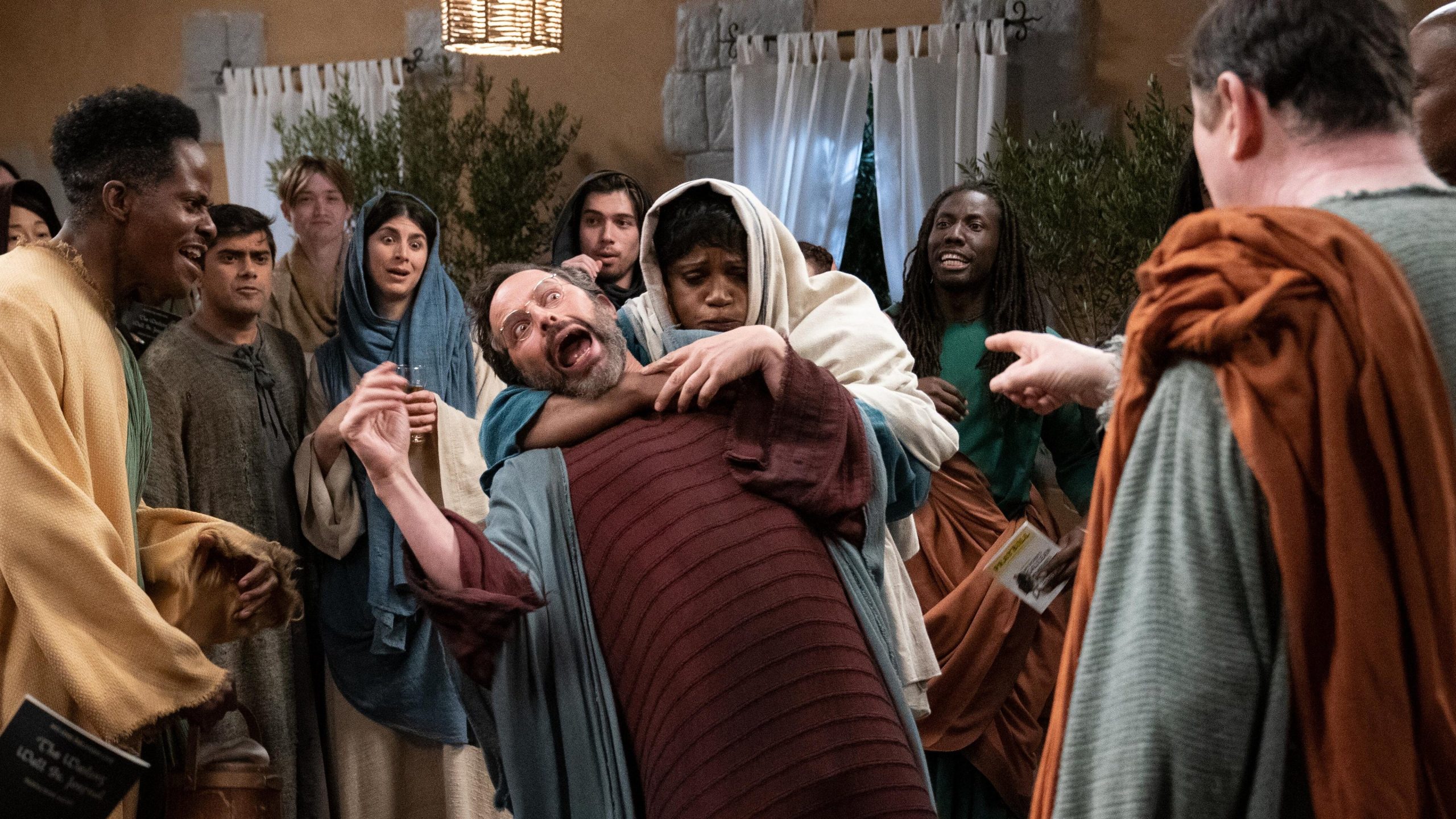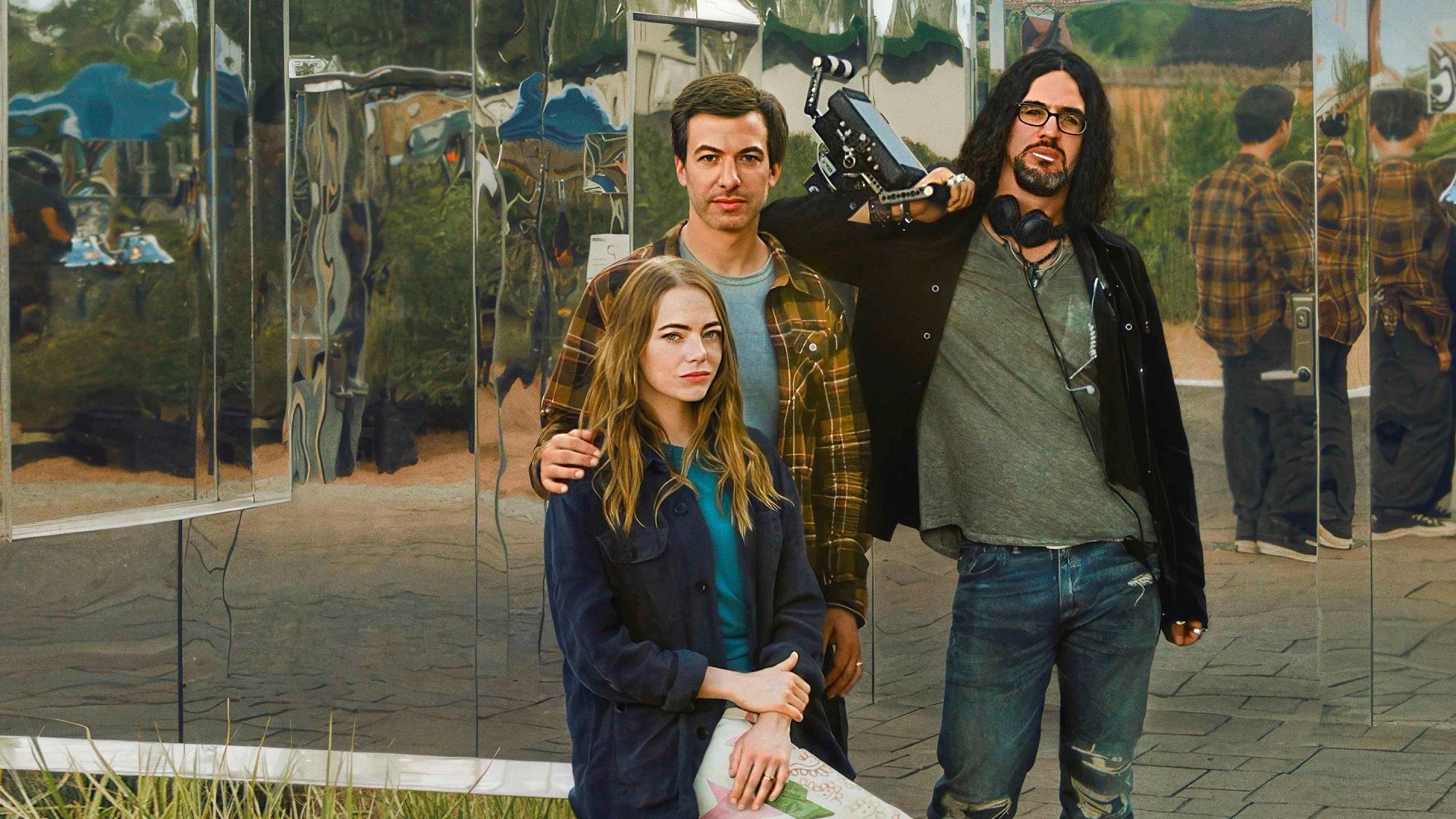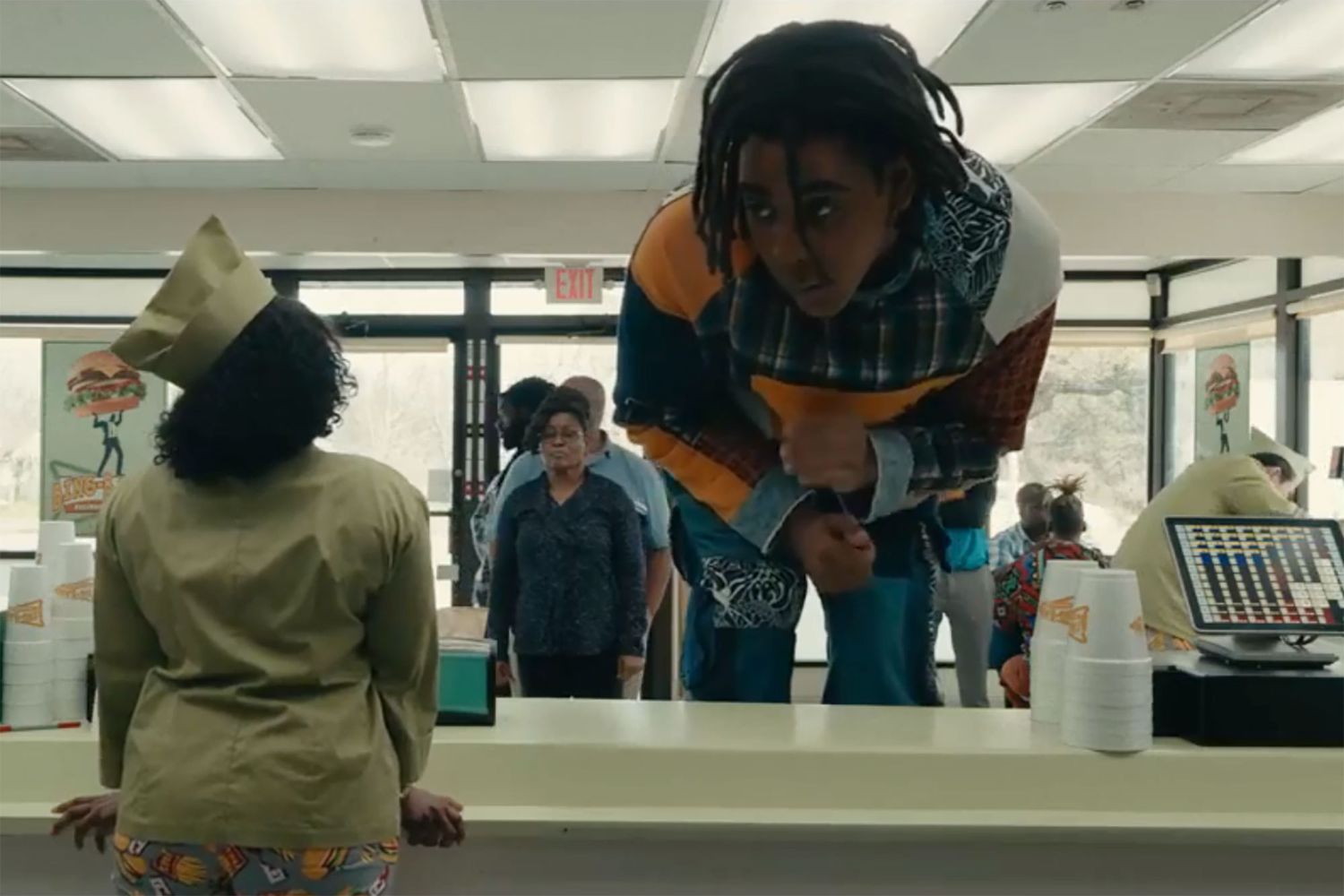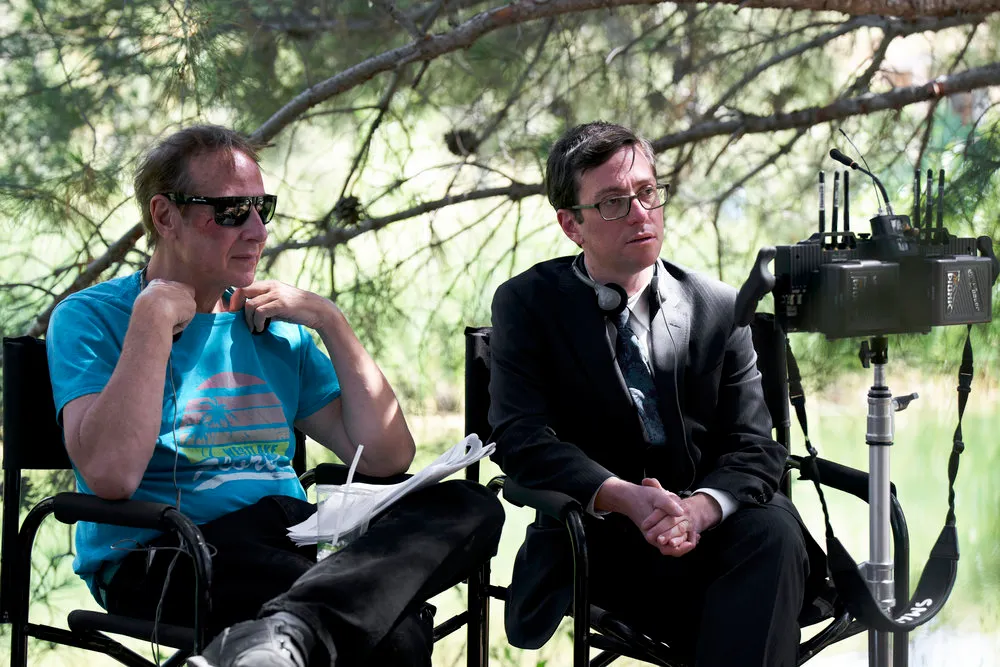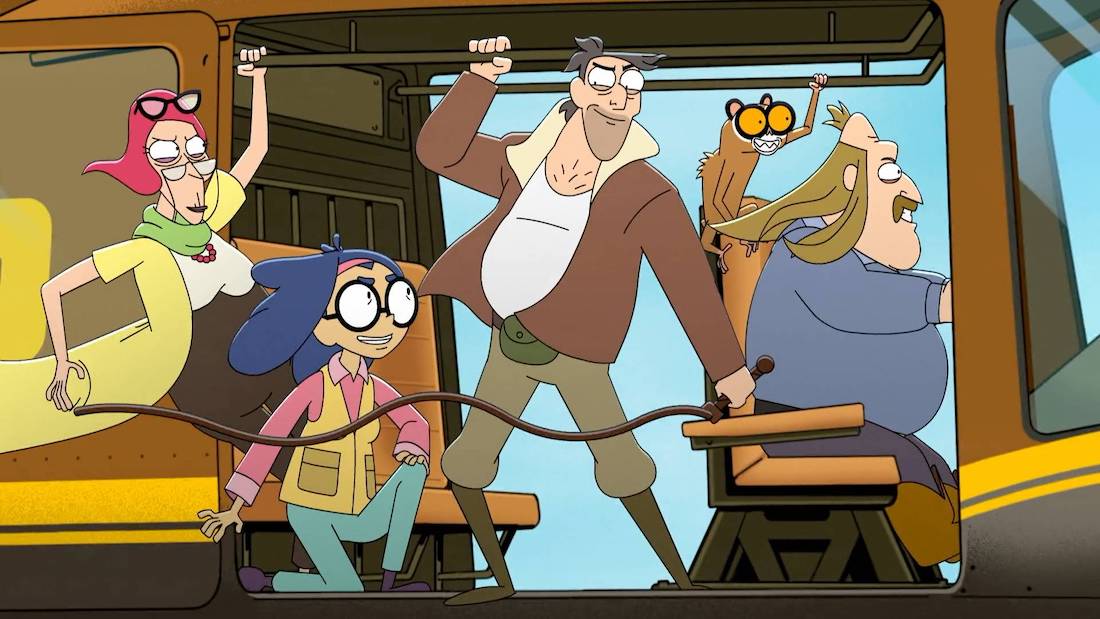We’re down to our final seven shows. I broke up the list the way I did rather than evenly because I had a lot more to say about the top than the bottom, and because these seven shows in particular were the cream of the crop on TV last year.
7. The Great, an occasionally true story
Season 3
Hulu
The best (if far from the most accurate) period piece on TV had another strong year, although it was slightly uneven, with the early episodes trying to restore some semblance of the status quo and a major character being written off so blatantly it was surely for behind-the-scenes reasons.
But even through that stretch, The Great had some great individual conflicts, particularly with Catherine and Peter navigating their current positions, the fallout from the end of season 2, and how to best raise their son Paul. As always, the show was gorgeous and hilarious throughout all of it. And then, halfway through the season, it dropped the bomb of the most audacious and unexpected plot twist I saw all year.
The second half of the season was incredible, as Catherine had to deal with that plot twist on both a personal level and a practical level as the ruler of Russia. And that’s not to sell the rest of this excellent cast short, as they maneuver around or behind Catherine to get what they want, or otherwise try to work with or manipulate her to that end.
And that level of quality continues all the way to the very end, as the season finishes with a very strong finale, both with Catherine’s own actions and with the unexpected that needs to be dealt with (as always, you can’t count on other people to do what you want them to do).
Sadly, Hulu canceled The Great after this season. I never understood why it didn’t get more acclaim or attention. I thought people loved period dramas about royalty, and The Great gave us all the best aspects of those shows: the court intrigue, the great performances, the gorgeous costuming and settings, the tight care of the plotting. It did all this while being far, far funnier than any costume drama or period piece on TV I can recall. The Great was one of the best shows on television from 2020 to 2023, and so I’m sad we won’t get more. But it was a consistently excellent, top-tier show while it aired, and if you somehow never got around to it, the whole series is absolutely worth your time.
6. History of the World, Part II
Miniseries
Hulu
I had a blast with this. Generally speaking, I am a pretty easy mark for a sketch comedy show done well. But you’d be forgiven for your skepticism that a sketch show reviving a feature film more than 40 year old (and a promise made at the end credits of that film) would be really worth your time.
But it’s sketch comedy; you already have loads of material to draw the premises from (the entire, um, history of the world), you get the right actors and writers for this, and you can make it sing. And History of the World, Part II has an absolute murderers’ row of talent. Nick Kroll, Wanda Sykes, and Ike Barinholtz are the three main players here, but there’s a whole lineup of killer actors and writers; each episode is credited to fifteen writers, which seems like a lot, but in sketch comedy where the premise is already established, that really just means a lot of jokes to choose the best from. The cast list is insanely long and packed with dozens of names you’ll recognize, whether that’s Johnny Knoxville as Rasputin (and the rest of the Jackass cast murdering him, eventually), Danny DeVito as Tsar Nicolas, Jake Johnson as Marco Polo, Richard Kind as St. Peter, Ken Marino as an archbishop looking to make the story of Jesus more palatable for white people, and many, many more.
The biggest runner throughout the show is Shirley!, a Norman Lear-style 70s Black sitcom with Sykes as Shirley Chisholm, dealing with the obstacles a Black woman in 1972 would face running for president and struggling to gain recognition. (In the casting decision I never would have expected but probably should have, Chisholm visits George Wallace, the segregationist governor of Alabama, in the hospital after he survives an assassination attempt; naturally, the governor is played by… George Wallace.) Another runner features Kroll as “Schmuck Mudman,” the henpecked patriarch of a family of Russian peasants living through the revolution and Lenin’s USSR, as his wife pushes him to assassinate Lenin. (Jack Black plays Stalin, a casting decision I don’t think even occurred to Armando Iannucci.) Barinholtz plays General Grant in a Civil War runner where Lincoln (Timothy Simons) places his son Robert in Grant’s care, which naturally leads to Grant sending the boy on a liquor run that quickly goes awry.
The story of Jesus also gets three tellings: once as a love story with Mary Magadalene a la The Notebook; once as a riff on Get Back, as “the Fab 13” prepare the “final sermon”; and my favorite, a riff on Curb Your Enthusiasm called “Curb Your Judaism,” with Kroll as Judas in the Larry David role (and, of course, J.B. Smoove as Luke).
But this just scratches the surface of what the show has to offer. I was really impressed with the consistency and the number of laughs I got from the show. Working with this much historic material might be playing on easy mode, but I’ve seen very little recognition of how funny the show was, and it deserves mention as one of the funniest shows of the year. Heck, I’ll go out on a limb and say it: It’s funnier than History of the World, Part I.
5. The Curse
Season 1 (?)
Showtime
I waited for this show to wrap, which it did the night of the 11th, before writing this article. (I thought it would have been silly to rank eight episodes of a 10-episode, possibly limited-run show. On that note, don’t expect to see the final episodes mentioned in the TV review of 2024.)
Written by Nathan Fielder and Benny Safdie, the show stars the two of them alongside Emma Stone. Stone and Fielder play Whitney and Asher Siegel, who are working on Whitney’s project to build eco-friendly homes and revitalize (gentrify) the little town of Española, New Mexico. Of course, they have ulterior motives for this, as Whitney also wants to use this premise to launch an HGTV show called Fliplanthropy, and the two of them are buying up land and hoping the show will drive up the property values of their investments.
Also in tow is Safdie as Dougie, an experienced producer who’s effectively running the Fliplanthropy production and serving as a liaison to HGTV, and a bit of a scumbag (and a bully to Asher) who’s still dealing with his own traumatic past (and refusing to accept his responsibility in it).
The titular curse comes (seemingly) from the first episode, when a little local girl curses Asher after he botches an interaction Dougie is filming to use as material to use in a little segment to show the Siegels giving back to the community. Asher starts freaking out about the curse, and a couple of strange happenings suggest it might even be real. The Siegel marriage is already a bit strained, and those cracks grow wider and wider with Whitney’s increasing disdain for Asher, a charisma vacuum and a cipher who seems to have no backbone or interests of his own other than pleasing Whitney– cracks Dougie is all too happy to exploit and widen, either for the show or for his own entertainment.
So much of the show’s theme is reflected both in the warped title sequences for each episode and the, uh, reflective “passive houses” Asher and Whitney are selling. So much of the show is an exploration of Asher and Whitney’s desire to be seen as good people: seen as helping a community they’re really gentrifying for profit and fame; seen as trying to do the right thing without always thinking through the consequences, and so forth. That doesn’t mean they aren’t trying to the right thing, at least at times: People are complicated, after all, and I think, particularly in Whitney’s case, that there is desire to do good, that’s clouded by a certain rich-white-woman privilege and by the reality of what they’re really doing in Española. (Dougie doesn’t seem to particularly care whether anyone thinks he’s a good person, but he’s got plenty of his own issues on top of being a manipulative sleazebag.) In each of their cases, the story isn’t just about their need to be seen a certain way; it’s also about whether that need is a means of avoiding confrontation with who they really are.
It’s compelling drama, it’s incredibly uncomfortable and anxiety-inducing at times– probably exactly what we should expect from a Fielder and Safdie collaboration– and it’s really funny on top of that. The performances are incredible, too: The talent that made Stone a movie star is very evident here, and Fielder and Safdie get some showcases that show they can be on her level when the show needs them to be.
And then, that ending. I said The Great may have had the best and most audacious plot twist I saw all year because I’m not even sure what happens in the finale of The Curse can even be called a “twist” per se. It seemingly upends so much about the entire show’s premise. Or perhaps serves as a metaphor. I have my theories, but I have no idea which ones are correct.
In the end, though, The Curse was, all the way through, surefire appointment television. Nothing else on TV quite captured its unsettling vibe and tension, and it was immaculately made in every detail. The Curse was one of the most fascinating shows of the year– and one I still find myself thinking about.
4. I’m a Virgo
Season 1 (?)
Amazon Prime
As one might expect from Sorry to Bother You, Boots Riley’s first original TV series is a sci-fi-tinged exaggeration of our current times to more directly comment on those times, and particularly on racism and capitalism. And it’s just as inventive, stylish, fun, and on point as you would expect, too.
The basic premise involves a bit of sci-fi: Giants do exist and appear in the world from time to time. Cootie (Jharrel Jarome) is a 13-foot-tall 19-year-old being raised by his aunt and uncle (Carmen Ejogo and Mike Epps) in Oakland, where they work to shelter him from the outside world due to how he would be received as a 13-foot-tall Black 19-year-old. (Hard not to think of Mike Brown, and Darren Wilson describing him like a monster or demon attacking him. Imagine, considering how much the media and white conservatives portray young Black men as inherent threats due to their very existence, what they would do if one was literally 13 feet tall.)
Eventually, though, Cootie wants to see the outside world, and he sneaks out and hooks up with a few locals who become his friends– Felix, Jones, and Scat. He also meets Flora, who works at the Bing-Bang Burger (another great example of Riley’s slight exaggeration of our reality, with the heightened in-your-face nature of Bing-Bang Burger’s commercials)– and has a superpower of her own.
Cootie can’t really get out much without being noticed, though, and he quickly becomes a local sensation known as the “Twamp Monster,” with offers for modeling and other gigs, while his friends try to acclimate him to the real world, teach him what it’s like, and protect him from the people who want to exploit or demonize him. Then about midway through the season, something happens that spurs the local community to collective action– against the for-profit hospitals in their neighborhood, against the electric company that rolls blackouts through their neighborhood to keep richer neighborhoods from losing power. And this action draws the attention of The Hero (Walton Goggins), a for-real local superhero (well, in the Batman vein of “really rich guy who uses a bunch of gadgets to become a superhero”), whose commitment to law and order above all leads him to be the enforcer of an unjust system.
It all moves pretty fast, it’s very funny, and it’s got those unique Boots Riley touches. As usual, Riley’s sense of style is arresting; he also doesn’t bother with subtlety when it’s time to make a point, perhaps most notably in the climactic scene, when one of Cootie’s friends uses their unique gifts to save him and to make clear to The Hero just what kind of system he’s upholding. The little details of character are funny, like Cootie’s uncle Matisse being a songwriter in his spare time. Another strange touch is a cartoon called Parking Tickets, which is most notable for an episode that was banned because everyone who watched it went into catatonia.
Much like with Sorry to Bother You, Riley uses supernatural elements and exaggerations of our real world (that may not be as exaggerated as we’d like to think) to make points about our real world, while also being very funny, with a well-paced and plotted story, and an excellent and precise visual sense. Lots of people could tell you how racism and capitalism intersect to create a permanent underclass and uphold an unjust social order through violence; only Boots Riley could do it while being so visually striking, mesmerizing, and funny.
(Also, this is the third fucking time this year I’ve put a question mark next to the season run. I wish these networks would clear up whether or not these shows are intended to be limited series.)
3. Paul T. Goldman
Miniseries
Peacock
Our biggest quasi-documentary oddball of them all is, of course, Paul T. Goldman. One of the year’s earliest shows is long in the rearview mirror, but the tale of a nebbishy guy who rewrites the story of his own life remains as compelling and unforgettable as it is bizarre and unbelievable (and, well, often unbelievable for good reason).
Paul Finkelman’s second marriage happened quickly and got off on the wrong foot just as quickly, as he soon discovered his new wife was scamming him out of money. Paul did some investigating into this, and who she was spending her time with, and discovered she was spending her time with another man, and perhaps in unsavory ways… and seemingly uncovers a criminal ring.
Or perhaps this is where his imagination gets the better of him.
He rebranded himself Paul T. Goldman, wrote books about his experience (and crime/thriller fiction based on it) and started, literally, tweeting at directors to help him make his story. Jason Woliner saw one of these in 2012 and took him up on the offer. And, yes, this show was ten years in the making.
Woliner turns this story into a fascinating, multi-layered production: We move through Paul’s version of events– including the books he wrote about his experiences, and the books he fictionalized about the hero he imagines himself being in the face of such forces– and the behind-the-scenes making of that version of events, both the real events and the fictional ones… along with Woliner trying to find the real people in Goldman’s story and get to the real truth of what happened, and consulting Paul about what he’s making, and ultimately confronting Paul with what he finds.
While opinions on the kind of guy Paul is are divided, I don’t think a judgment of Paul matters to the show as much as how mesmerizing the whole experience is. The story is wild enough, and for my money Paul is a strangely compelling character, but Woliner deserves a lot of credit, for his excellence in dealing with Paul and for getting to the truth, as well as the way he guides the show as it moves through various layers of reality. All those add up to make an incredibly compelling show, one that will push at the boundaries of our comfort: Is this exploitation? Is this indulgence? What does it say about this work that you can legitimately ask both of those questions? And it’s incredibly funny throughout all of that, as well.
There was just nothing like Paul T. Goldman on TV last year. And there probably won’t be again for a long time.
2. Digman!
Season 1
Comedy Central
Perhaps my biggest surprise entrant of the year, in that Digman! was a show I only recall learning about in passing and that didn’t get much buzz or publicity, and it turned out to be one of the very best that I watched. Created by The Lonely Island (specifically, Andy Samberg and Neil Campbell), the show is set in the world of celebrity archeologists and adventure.
Samberg plays our hero (of sorts), Rip Digman, giving his best “Nicolas Cage in National Treasure” impression to a guy who let himself go to seed in 2011 after his wife died and his trusted assistant betrayed him. Now teaching archeology classes, his interest in getting back in the game is sparked by an overeager student, Saltine (Mitra Jouhari), who becomes Digman’s assistant. Tim Robinson plays Swooper, Digman’s pilot; Dale Soules is Agatha, his elderly, seen-it-all secretary. Also featuring Tim Meadows as the billionaire Quail Eegan, who runs the largest museum in the world, and Guz Khan as Zane Troy, the former assistant who betrayed Digman and is now head archeologist at said museum.
Digman’s main goal for the season is to find the Holy Grail and bring his wife Bella (Melissa Fumero… wait a minute, this isn’t a Brooklyn Nine-Nine spinoff, is it?) back to life, but of course he’s going to have to undergo a lot of quests before then to restore his reputation in the “arky” world, whether that’s finding the Fountain of Youth, the backup copy of the Ten Commandments (it makes sense in context), Shakespeare’s lost sonnet (banned because hearing it makes people spontaneously orgasm), or what really happened to Amelia Earhart. (This isn’t even the only show this year to ponder that question, as History of the World, Part II has its own Earhart segment, and Bob’s Burgers‘ season 13 finale features some speculative fiction on the subject, but I digress.)
Digman! works like gangbusters for much the same reasons the first season of Rick and Morty caught fire in the public’s imagination: That is to say, it combines outlandish adventure; inventive, dizzyingly fast-paced plots that continually go far beyond where we expect them to; and a density and variety of smart, sharp humor that also never lets up. Digman! was minute-for-minute the funniest TV show I watched this year.

1. The Righteous Gemstones
Season 3
HBO
“But I think it’s about forgiveness…”
Maybe there’s the personal element here. Most of you know my father passed away a couple of months ago, and that’s had me thinking a lot about both death (past more than impending, mostly) and family. Perhaps more importantly, I’ve had to deal with both directly, not just think about them.
In that context, the finale, and particularly the final scene, really hit me hard emotionally. I was just left with the thought that this family has been through feuds that, not to spoil too much, involved kidnapping, attempted murder, and a mass bombing… and yet, even they still find a way to forgive each other and come together in the end. Why can’t mine?
But my own personal problems aside, The Righteous Gemstones is the best show of the year because it takes what’s already one of the best shows on television and elevates it to another level with more complex family dynamics and history, and it’s still as riotously funny as ever on top of that.
Eli is now officially retired, and his three children are doing their best to run the church, although none of them are particularly suited for it. The biggest story this season is the return of Eli’s sister May-May Montgomery into his life, as her husband, Peter, is out of prison and leading a militia– with their two sons by his side– and talking a big game about the Gemstones’ sins and false prophecy. She just wants to get her sons away from his influence, but something like that is going to necessarily pick at old wounds: If Eli’s sin is greed (setting aside the wrath we saw last season), then May-May’s is pride. (The midseason flashback episode, “Interlude III,” sheds further light on how those sins caused this relationship to fracture.)
The rest of the Gemstones take big steps as well. Judy’s singing career has taken off, and she has to confront the consequences of how she’s used her quasi-fame to indulge herself. Kelvin continues to struggle to find the right role for himself in the church, until he finally commits to something real in an unabashed moment of triumph. Gideon may prove to be the truest sign of the old adage that talent skips a generation. And even Jesse is making his best effort to be a better church leader, brother, and father. Baby Billy is, of course, still Baby Billy, bored with performing poolside in elaborate getups for uninterested guests at Zion’s Landing, and pitching ideas to get himself back in good with the Gemstones– and preferably on TV, where he surely belongs.
Some of the stories got a little bit short shrift this season– what is the deal with the Cape and Pistol Society? Why did we barely get any development for the Simkins?– but the main story with the Gemstones and the Montgomerys, about family and forgiveness, was so good and gave our characters so many different notes to play– even forcing the Gemstone siblings to grow up a little– that it elevated an already-great show into the best on TV. It doesn’t have to be perfect if the best is better than we’ll get anywhere else, and The Righteous Gemstones surely was that this year.
That’s the end of the countdown, but in a bonus article, tomorrow we’ll be sharing the most memorable TV moments of 2023.

